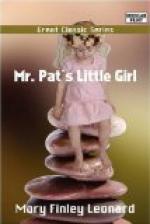As Martin went to work trimming the ivy under his mistress’s direction, Rosalind wandered away by herself across the hill-top, pausing now and then to read an inscription and do a sum in subtraction, on the result of which her interest largely depended. “Lily, born 1878, died 1888,” stirred her imagination, and she sat down to consider it at length. How old would Lily be now if she had lived? She tried to think how her own name would look on a stone. It was still and peaceful on that sunny hillside; it reminded her of “Sharon’s lovely rose.” The idea of a grave here was not unattractive. She was considering it pensively when her eyes fell on a long-stemmed, creamy rose, lying not far from her on the ground. With instant pleasure in its beauty she took it up and held it against her cheek.
Where had it come from? Some one must have dropped it. She stood up and looked around, but there was no one in sight. On the other side of a holly bush, however, a number of just such roses lay on a grave. Rosalind walked over and stooped to read the name on the low headstone. “Robert Ellis Fair,” she repeated half aloud as she laid her rose beside the others.
When she lifted her head she met the surprised gaze of a young lady, who came across the grass with a watering-pot in her hand. She was decidedly pretty to look at, and she smiled pleasantly as she began watering the flowers in an iron vase.
Rosalind felt she must explain, so she said, smiling in her turn, “I found a rose on the grass, and I thought it must belong here.”
“Thank you. I suppose I dropped it. Won’t you tell me who you are? I am sure you do not live in Friendship.”
“No, I am visiting my grandmother. I am Rosalind Whittredge.”
A strange expression crossed the face of the young lady at this announcement. Could it be that something displeased her? After a moment she spoke gravely, “I think some one is looking for you,” she said.
Turning, Rosalind saw Martin in the distance, and as there seemed nothing else to do or say, she walked away. After she had gone some little distance she could not resist looking back, and just as she did so she saw the young lady fling something from her across the grass, and—it looked like a rose! Could it be her rose? Rosalind felt her cheeks growing hot. How very strange! Here was a puzzle, indeed.
Aunt Genevieve had come for them in the carriage, and as they drove home Rosalind tried to describe the young lady she had seen, saying nothing about the rose, however.
“It must have been Celia Fair, mamma, don’t you think so?” asked Genevieve.
“Fair was the name on the stone,” said Rosalind, adding, “She was pretty.”
Miss Whittredge looked at her mother, then as that lady was silent, she remarked, in her usual languid tone, “I think you may as well know, Rosalind, that we have nothing to do with the Fairs.”
Why did it make any difference to Rosalind? Why did everything seem wrong? Why did she feel so unhappy in spite of the blue sky and the sweet summer air?




